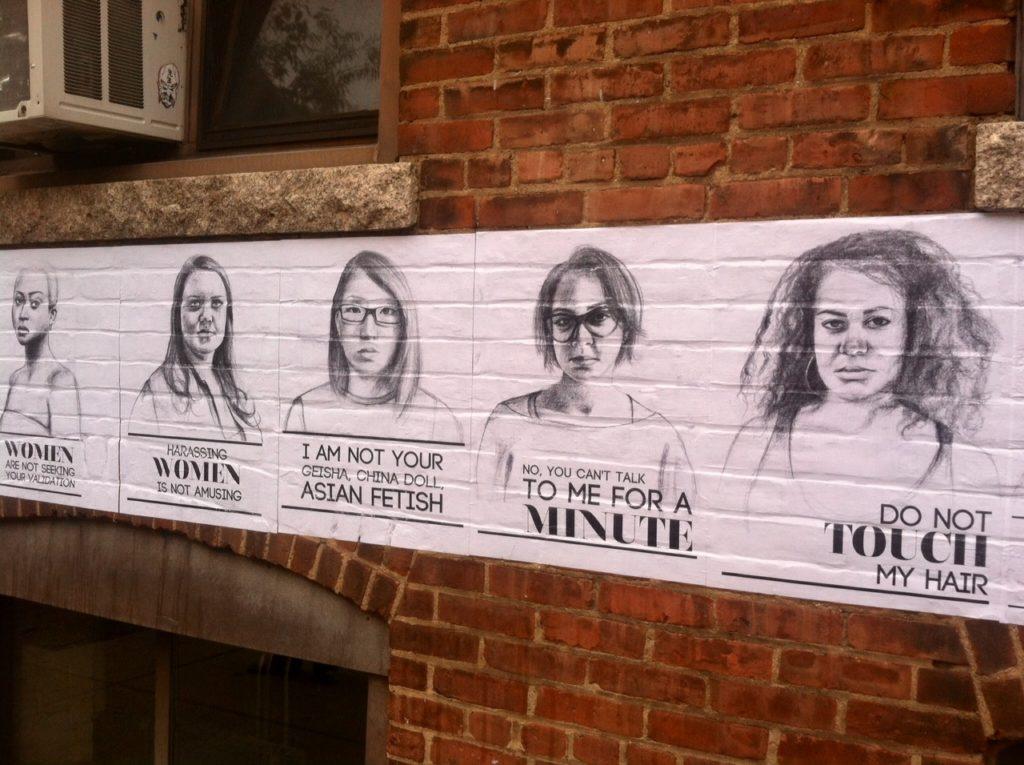By Erica Moser, news correspondent
Within the past years, there has been an increase in social movements centered around harassment and ‘everyday sexism.’ This week, Northeastern introduced a public art display by Tatyana Fazlalizadeh addressing the issue of street harassment.
Fazlalizadeh’s project, “Stop Telling Women to Smile”, deals with the phrase ‘Come on show me a smile,’ a sometimes familiar and relatable comment heard while walking down the street.
“It’s for their comfort, not yours,” Fazlalizadeh said of men who tell women to smile, “and I think it sucks that people put this emotional responsibility on women to be happy all the time.”
Fazlalizadeh was present at “Block Party – Northeastern Stands Together Against Harassment,” an event held in Centennial Common on Tuesday from 2-5 p.m. The event featured representatives from the Office of Student Conduct and Conflict Resolution (O.S.C.C.R.); Violence Support, Intervention and Outreach Network; Social Justice Resource Center; Strong Women Strong Girls; Girls’ LEAP and Hollaback! Boston.
Using wheat paste, students helped Fazlalizadeh adhere artwork to the façade of the Latino/a Student Cultural Center, on Forsyth Street. The piece features a woman’s face and the words “NO ME LLAMO MAMACITA,” which translates to “DO NOT CALL ME MOMMY.”
Fazlalizadeh, an oil painter before a street artist, started the project for herself, but then “found out people related to it,” she said. She began interviewing women, drawing their portraits and incorporating text inspired by their experiences on her posters.
The project started in Brooklyn in 2012 but has spread to Philadelphia, Los Angeles, Atlanta, Baltimore, Chicago, Mexico City and Berlin.
“There’s no avoiding it when it’s plastered on the wall,” third-year English major Jillian Ferrari said. “I think it’s great to have it out in the open, in a campus environment.”
Centennial Common featured musical performances, a monologue from the theatre department’s upcoming run of “Antigone,” chalking about harassment and bystander intervention demos from Acting Out, a student group that promotes social change through performance.
There were also signs advocating the four principles of bystander intervention: direct, distract, delegate and delay.
Different organizations – student-run, faculty and off-campus – had booths to promote resources related to harassment.
Briana R. Sevigny, assistant director of O.S.C.C.R., wanted students to know that harassment is covered in the Code of Student Conduct and that O.S.C.C.R. has an online reporting form.
“We live in the city,” Sevigny said. “People come from all different experiences, and they have different understandings of what is okay and what isn’t.”
Different representatives from Northeastern offered opinions about why some men harass women.
“I think it can go both ways – they’re aware of it, they’re not aware of it,” said Jessica West, one of the lead teachers at Girls’ LEAP, which teaches girls ages eight to 18 self-defense, said. “I think a lot of it is it’s a huge boundary thing, and not realizing you’re disrespecting a woman’s personal space.”
Noah Kelley, team associate for the anti-street harassment organization Hollaback! Boston, said “men often think that they’re just being playful, or just giving a compliment,” because “there’s often not really a vocabulary for street harassment.”
Seth Mulliken, assistant academic specialist in the Media and Screen Studies program at Northeastern, said some common misconceptions on street harassment are that it’s “benign and harmless” or “just an annoyance.”
At the Strong Women Strong Girls table, the effort was to give out good vibes and “to combat the negativity that street harassment brings,” third year communications and political science major Shelby Sih said.
“We can actually be really kind to each other on the street, to each other and to strangers,” Sih said. “It doesn’t have to be all degrading.”
Photo by Erica Moser









